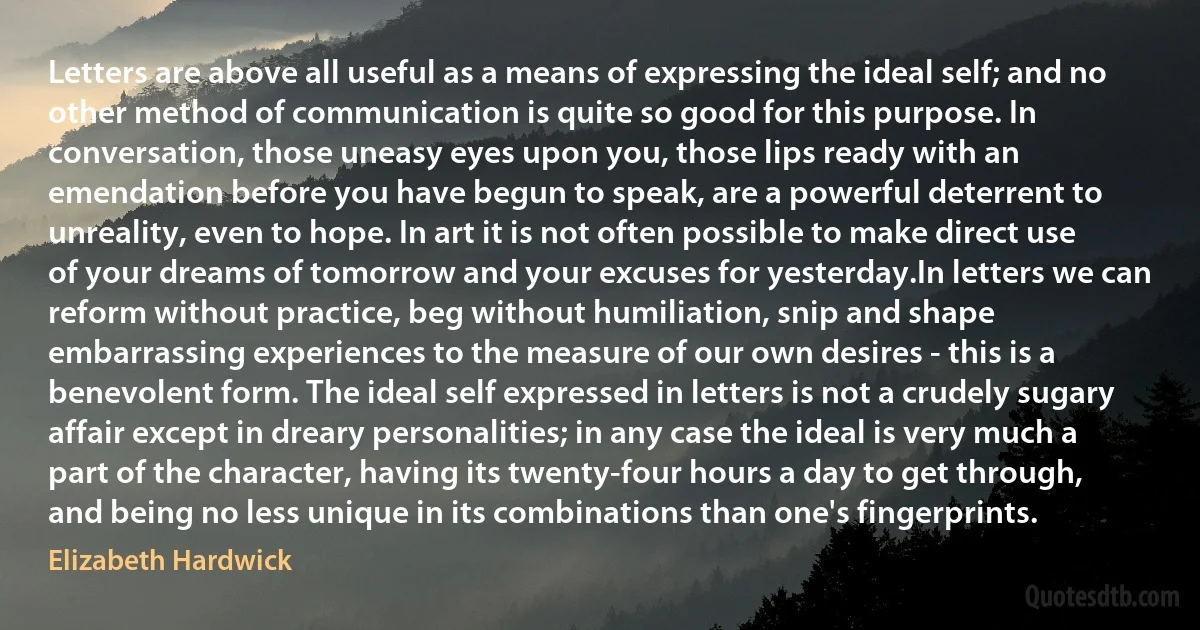
Letters are above all useful as a means of expressing the ideal self; and no other method of communication is quite so good for this purpose. In conversation, those uneasy eyes upon you, those lips ready with an emendation before you have begun to speak, are a powerful deterrent to unreality, even to hope. In art it is not often possible to make direct use of your dreams of tomorrow and your excuses for yesterday.In letters we can reform without practice, beg without humiliation, snip and shape embarrassing experiences to the measure of our own desires - this is a benevolent form. The ideal self expressed in letters is not a crudely sugary affair except in dreary personalities; in any case the ideal is very much a part of the character, having its twenty-four hours a day to get through, and being no less unique in its combinations than one's fingerprints.
Elizabeth HardwickRelated topics
above art beg begin case character communication conversation day embarrassing form good having hope hours humiliation less measure possible practice purpose quite ready self speak tomorrow unique unreality use yesterday means lips eyesRelated quotes
I have already accepted the policy of Imperial preference...to the effect that a preference will be given on existing duties and on any duties which may subsequently be imposed. On this subject I think there is no difference of opinion between us. ... I am prepared to say that the key industries on which the life of the nation depends must be preserved. I am prepared to say also that, in order to keep up the present standard of production and develop it to the utmost extent possible, it is necessary that security should be give against the unfair competition to which our industries have been in the past subjected by the dumping of goods below the actual cost of production. ... I shall look at every problem simply from the point of view of what is the best method of securing the objects at which we are aiming without any regard to theoretical opinions about Free Trade or Tariff Reform.

David Lloyd George
The Age that admires talk so much can have little discernment for inarticulate work, or for anything that is deep and genuine. Nobody, or hardly anybody, having in himself an earnest sense for truth, how can anybody recognize an inarticulate Veracity, or Nature-fact of any kind; a Human Doer especially, who is the most complex, profound, and inarticulate of all Nature's Facts? Nobody can recognize him: till once he is patented, get some public stamp of authenticity, and has been articulately proclaimed, and asserted to be a Doer. To the worshipper of talk, such a one is a sealed book. An excellent human soul, direct from Heaven,-how shall any excellence of man become recognizable to this unfortunate? Not except by announcing and placarding itself as excellent,-which, I reckon, it above other things will probably be in no great haste to do.

Thomas Carlyle
What! when it is necessary to take the most simple resolve, we are under the domination of our habitudes, our wants, our social relations, and a host of causes which, all of them, draw us about in a hundred different ways. These influences are so powerful, that we have no difficulty in telling, even when referring to persons whom we are scarcely acquainted with, or even know not at all, what is the resolution to which they will lead such parties. Whence, then, this certainty of foresight, exemplified by you daily, if you were not convinced, at the outset, that it is extremely probable the empire of causes will carry it over free-will. In considering the moral world a priori, you give to this free-will the most entire latitude; and when you come to practice, when you speak of what passes around you, you constantly fall into contradiction with yourselves.

Adolphe Quetelet
It should be clear by now that there are people who can, in fact, be reasonably considered experts; that it is rational to rely, within limits, on ex pert opinion; and that it is possible, by exercising relatively simple criteria, to gain insight into whether a particular expert is reliable or not. It is also true that experts, of course, do make mistakes, and that even the agreement of a large majority of experts in a field does not guarantee that they got it right. That's the nature of scientific truth, as we have seen throughout this book: it is tentative, because it is the result of a human endeavor that is limited both by the type and amount of available evidence and by humans' finite mental powers and emotional reactions. But the examples above show how you can, with a little bit of practice, tell science from bunk!

Massimo Pigliucci
I have an action pending before the Legate [Titian's friend, Giovanni della Casa ] here against the brothers of [the church] San Spirito of whom I hear they mean to tire me out by delays. Their purpose is to obtain a commission or brief, by which my cause shall be transferred to another judge, who is their friend. I beg your Reverend Lordship, in remembrance of my services and in view of the importance of the case to give Monsignor Guiddicioni to understand that he may not pass anything contrary to me, but trust to the goodness and sufficiency of Monsignor the Legate [Titian's friend] so that the brothers shall not have it in their power to ill-use me and create delays contrary to duty and justice; the matter being public at Venice where everyone knows that these brethren are old and certain debtors to me for my works.

Titian
